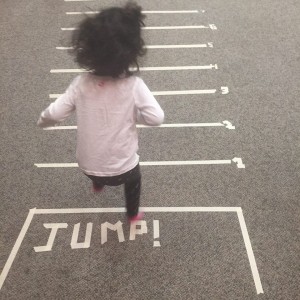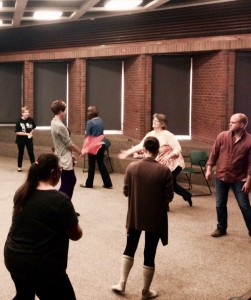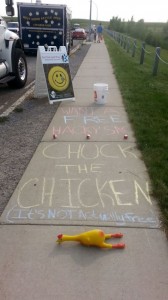A book, a magazine, a tennis racquet anyone? Families in Lethbridge, Alberta, now have a new opportunity to try out some options to have fun and keep fit, thanks to the availability of sports equipment and new programming at the library.
The Lethbridge Public Library Physical Literacy project was born from networking with community organizations in Lethbridge, Alberta. A trend that was noticed was that many community organizations were focused on health and wellness in the community. Dr. Mary Dyck, Kinesiology professor at the University of Lethbridge, provided further insight into community wellness through her research identifying a large “free play” gap in Lethbridge, as opposed to participation in organized sports activities. Professor Dyck introduced the concept of physical literacy to the library. Physical literacy is a foundational skill in everyone’s lives. In short, physical literacy enables an individual to move with competence and confidence and thus want to move more, including getting out and visiting the library.
But why physical literacy? Why not ecological literacy or media literacy or any of the other adjectives that get tacked onto literacy these days? As mentioned, physical literacy is a foundational skill for everyone in the community, not for a specialized subset. The health-related benefits of being able to move include: improved chronic disease resistance, cardiac function, and improved bone density. Psychological benefits include enjoyment, reduced depression and anxiety, increased social connections, getting outdoors, and learning and mastering new skills. People who can move with competence and confidence become more independent. They can move and take care of themselves by being strong, flexible, and able to endure. Children can learn fundamental movement skills which, in turn, will provide the foundation for lifelong daily activity. One of the goals of the library was to position itself as an outward facing, community organization.
This project aligned the library with the broad community goal of health and wellness with a specific foundational skill that applied to everyone in the community in a way that supported many community organizations and connected citizens to the library’s programs and collections. All for an initial investment of $2,500.
Because Lethbridge has many organizations that help the community with foundational movement skills, it was important for the library to supplement, not replace or recreate, the work that was already being done in our community. For example, the University of Lethbridge, PLAY Lethbridge, PLAY Coaldale, Lethbridge College – Be Fit for Life Centre, and the Lethbridge Sport Council all have existing programs or skill-building activities. In order to supplement these activities, the library offered to provide a circulating collection of outdoor sports kits that encourage free play. The library would promote the kits and physical literacy through programming and advertising.
A pilot project of a circulating sports collection was proposed and $2,500 was acquired for the project from the library’s 2015 budget. The library’s existing Toy Library provided the model for circulation and acquisition logistics.
The project’s goals are to:
- Encourage physical activity through physical literacy kits,
- Integrate the current infrastructure of the local libraries with the city’s recreational spaces, and to
- Provide accessible equipment and instruction to allow children, youth, and families to be outdoors and physically active.
Cristina Miller of the University of Lethbridge Kinesiology department was hired as an applied studies student in exchange for an honorarium paying for the cost of one of her courses. She was invaluable as she helped source the items for the collection, organize and assemble the collection, and promote the collection in the community. Customers can borrow basketballs, baseball kits, soccer balls, skipping ropes, horseshoes and lawn darts, pickleball, Hi-lo scoopball, beach volleyball equipment, and the now-famous rubber chickens and rubber pigs: all motivational throwing tools.
Because of the existing relationships with the Lethbridge Sport Council and PLAY Lethbridge, the library was able to integrate into its community activities and become a host for their first ever Physical Literacy Summit at the Crossings Branch. This project has also received national recognition through a 2015 Royal Bank of Canada Learn to Play Leadership grant.
The kits are “low-tech” and easy to use. The items are kept in large Ziploc bags catalogued as a kit; each item is barcoded. Each kit contains an instruction booklet that in very basic terms outlines how to use the equipment. The instruction booklets also contain a contents page with the barcode, and a “first time” user survey that gets returned to us. The kits are kept in a big Rubbermaid tote housed wherever there is accessible space. The kits circulate like regular items.
Library staff received training from the sports’ partners on how to integrate physical literacy into existing programming. New programming has also been created based on community feedback. For example, the Bookmobile is the start point for a walking club. Patrons can borrow walking poles to use and keep track of their progress. During the winter, a new program “Move and Play,” is run for preschoolers to participate in structured physical activities. This is followed by free play activities using items from the physical literacy and toy collections. Even the “ESL Storytime” has physical literacy components, for example, name and vocabulary games are played using a ball. The programmer gushed about how tossing the ball back and forth broke down the intimidation of speaking in a group.
The success of the pilot project was measured through first time use surveys, circulation statistics, and staff and customer feedback. Thankfully the response has been overwhelmingly positive so the project will be expanded in 2016. This project promotes positive change in the community in a fun, barrier-free way.
Project milestones:
Pilot Project start: March 2015
Official launch: May 29, 2015
National Grant received: November 21, 2015
Phase 2 start: January 2016
Lisa Weekes is Manager: Information Services and Barbara Longair is Manager: Children’s Services, both at Lethbridge Public Library.
Test




